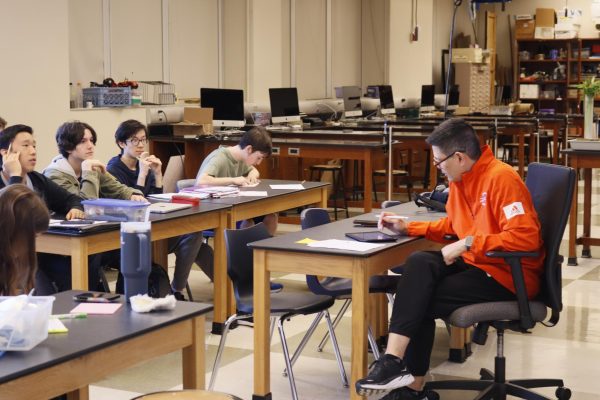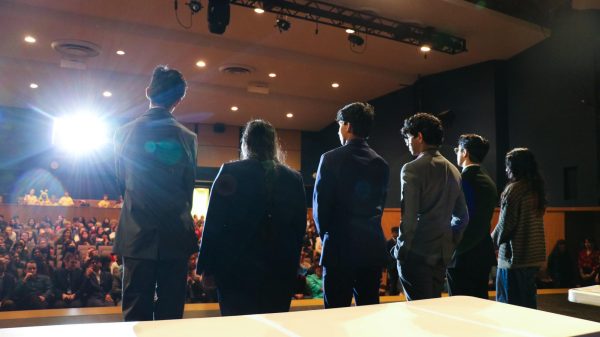From Prison to College
Wash U’s Prison Education Program
“You get in, go through security and walk through the yard. It really does feel like a prison,” Robert Henke, Professor of Drama and Comparative Literature at Washington University in St. Louis, said. “But once everybody gets into the classroom and gets settled in, it feels like a seminar room. You are a professor and they are the students.”
In the fall of 2014, Robert Henke, a former CHS parent, with fellow Washington University professor Maggie Garb, began their inaugural classes for the semester, 35 minutes from the Wash U campus. The classes took place in the Missouri Eastern Correctional Facility in Pacific, MO, and the students were prisoners incarcerated in the medium-security prison.
“About 60 students completed an application, which mainly consisted of a couple of essays. Of those we chose 30. They had to have a high school diploma or a GED,” Henke said. “I taught a course called ‘Text and Tradition: Classical to Renaissance Literature,’ a Great Books course from Homer to Shakespeare. My colleague Margaret Garb taught a survey of American history.”

Robert Henke
The Washington University Prison Education Program was modeled after a similar program in Upstate New York called the Bard Prison Initiative, who have graduated over 350 prisoners with Bachelor’s Degrees.
“Maggie Garb knew the people working at the Bard Program and they came to Washington University and gave a talk,” Henke said. “They agreed to give us a start-up grant.”
The courses taught at the correctional facility carry the same weight as the courses given in the traditional Washington University setting.
“We teach courses — it may not be at the exact same time — but the same courses. Same material, same reading list, same assignments, same grading criteria,” Henke said.
Currently, four classes are taught each semester, and the classes meet once a week for a three hour session. The students are given homework to be completed, similar to the students in college, and, like any student in college, their hard work pays off.
“They get Washington University credits so they’ll be able to transfer them to other institutions, even if they don’t continue at Washington University and University College when they get back,” Henke said. “Wash U units are pretty transferable.”
Thus far, one student who has taken classes through the Prison Education Program has continued his education at the University College, the adult extension school of Wash U.
Damon Hartley was released from the correctional facility in May of 2015. Three weeks later, he had applied to University College.
“The day that I got that actual acceptance letter … it was the happiest day of my life. I was jumping up and down like a little kid. I called everyone I knew. It was a wonderful feeling,” Hartley said.
Hartley is currently in his second semester at University College and is planning to major in Global Leadership and Management with a minor in Chinese. Hartley holds two work study jobs on campus and is also a self-employed business consultant.
In 2014, Hartley was introduced to the program by a flyer in the prison.
“I thought, ‘How could this impact me? How could this prevent me from ever having to come back to a place like this?’” Hartley said. “I knew that if I was accepted into the program, and then furthermore, looking down the line, envisioning myself graduating, I knew that it would be worthwhile and it would change my life in more ways than I could imagine. So far it has.”
Before his incarceration, Hartley went to college in the Air Force and took classes at St. Louis Community College.
“I never actually completed any courses,” Hartley said. “The first class that I ever took [at the prison] was Mr. Henke’s class and I not only completed it, but I got a pretty good grade too.”
Hartley values the Prison Education Program because of the motivation it gave him to become educated and pursue a better future.

Damon Hartley
“It’s my personal belief that, if a person can’t educate himself, even in prison, and get job skills, that’s just a guaranteed trip back to prison,” Hartley said.
One reason for the program is the data proving the incredible effect of education on incarcerated people.
“The recidivism rate — the rate at which people go back to prison — it’s generally about 50 percent nationally, but the numbers go down just dramatically if they’ve had college courses, and if they have a college degree it goes down to about two percent,” Henke said. “It’s really a good thing for the community.”
Particularly after the events in Ferguson during the fall of 2014, Henke and his colleagues have a heightened desire to help the surrounding communities of St. Louis. The professors at Wash U use their expertise and experience to positively impact the area.
“Washington University is pretty committed to giving back to the community. And this is what we do. We’re not going over there and being social workers, or helping with food drives, we’re going over there and being professors. We’re just doing what we do,” Henke said. “I think it’s a great way to give back.”
Not only does the program alter the future for prisoners after their release, but the environment inside the prison also experiences a change as a result of the program.
“What’s great is that they develop new relationships with each other and have different conversations now,” Henke said. “They really enjoy talking about the books. I heard stories of the men discussing the Odyssey in the prison weight room.”
The enthusiasm of the students, despite being in prison, is not overlooked by the Wash U professors.
“I don’t lose faith in the liberal arts and what I am doing, but sometimes I am less excited about it than other days, and it really shows you the value of an education in the liberal arts,” Henke said. “Wash U students really value their education very much, but these guys perhaps appreciate it even more because they didn’t expect to have this opportunity. They are really making the most out of it.”
Henke, Garb and other professors involved in the program are paid for their work in the prison.
“We do this as an overload. We usually teach two courses per semester, so this is a third course,” Henke said. “Sometimes it’s a bit difficult getting ready for class and getting out there. But I never drove from the prison back home feeling that I had wasted my time. It always felt really valuable.”
Not only has the program given the inmates an education, but also a piece of humanity that may be lost in the prison environment.
“[The prisoners] say this again and again: ‘For three hours I am not a prisoner, I am a college student,’” Henke said.
A $50 or more donation includes a subscription to the Clayton High School Globe 2024-2025 print news magazine.
We will mail a copy of our issues to the recipients of your choice.
Your donation helps preserve the tangible experience of print journalism, ensuring that student voices reach our community and that student democracy thrives.

I got a chance to sit down with Alex Bernard who is a senior at CHS and also the editor-in-chief of the Globe. “I didn’t originally see myself as an editor because I thought...

Camille is a senior at Clayton High School and has spent her time at CHS calling the Globe office her second home. She has a deep passion for journalism and enjoys the challenge...

Katherine Sleckman is a Sophomore. She loves to take pictures and play Lacrosse. Katherine is excited to be on Photojournalism for Globe for the first time this year.










